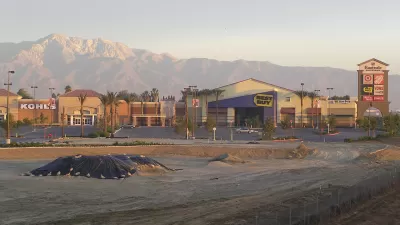My local community recently got into political spat as the city, county and state negotiated the terms of a deal to attract a major corporation to bring a facility to the community. In the interest of high-quality growth, tens of millions in dollars and various perks were offered to attract a very well-heeled corporate player. In the meantime, Floridians frustrated with the inability of government to be willing or able to keep up with growth in terms of providing the requisite infrastructure; sewer, water, transportation, etc., increased the pressure on governments to have new development pay for growth rather than having it increase the tax burden on existing residents. Let's see:
My local community recently got into political spat as the city, county and state negotiated the terms of a deal to attract a major corporation to bring a facility to the community. In the interest of high-quality growth, tens of millions in dollars and various perks were offered to attract a very well-heeled corporate player. In the meantime, Floridians frustrated with the inability of government to be willing or able to keep up with growth in terms of providing the requisite infrastructure; sewer, water, transportation, etc., increased the pressure on governments to have new development pay for growth rather than having it increase the tax burden on existing residents. Let's see:
- We are growing too fast to keep up.
- But we want more growth and are willing to pay to attract it.
- But we say that we want growth to pay for itself.
We struggle to have any consistent and equitable process for government investments in stimulating of growth and on more than a few occasions promised growth has failed to materialize or turned out to be a highly subsidized minor geographic relocations of economic activities whose net benefits are modest.
We want high-quality grow but we may be growing entry-level service workers faster. We want to attract high income jobs but we immediately get worried about affordable housing when home prices get bid up. At a personal level we are very excited about the appreciation of our homes; but of course we're frustrated that they are now taxed higher. We pine for creative class highly educated workers but we leave our borders open so we can benefit from cheap labor. We have visions of being globally competitive in high skill knowledge based segments of the economy and we tolerate mediocre schools and seldom reinforce the virtues of hard work and competition and risk huge shares of our future workforce being ill prepared to compete. We take money from the public to build sports stadiums and urban amenities then tout their economic stimulus impact while failing to account for the economic impact of taking those resources from the public's pockets. We celebrate signs of urban renaissance but often fail to understand the infrastructure investments required to upgrade our developed areas -- using dated logic to presume a resource efficiency from redevelopment or densification that has yet to materialize in a tangible fashion that feeds back into location and development decisions.
We want people to be responsible in how they make location and travel decisions but we continue to insulate them from the full cost of those decisions by refusing to let gas taxes or tolls rise to reflect the true cost of infrastructure provision say nothing of covering any of the externalities of the modes. We wax nostalgic for historic visions of personal travel ignoring the fundamental changes in household structure, personal time use allocation and 21st century economics. Democracy and human behaviors can be frustrating when it comes to complex multifaceted transportation and land use issues.
Other than that everything is fine.

Alabama: Trump Terminates Settlements for Black Communities Harmed By Raw Sewage
Trump deemed the landmark civil rights agreement “illegal DEI and environmental justice policy.”

Planetizen Federal Action Tracker
A weekly monitor of how Trump’s orders and actions are impacting planners and planning in America.

Why Should We Subsidize Public Transportation?
Many public transit agencies face financial stress due to rising costs, declining fare revenue, and declining subsidies. Transit advocates must provide a strong business case for increasing public transit funding.

Understanding Road Diets
An explainer from Momentum highlights the advantages of reducing vehicle lanes in favor of more bike, transit, and pedestrian infrastructure.

New California Law Regulates Warehouse Pollution
A new law tightens building and emissions regulations for large distribution warehouses to mitigate air pollution and traffic in surrounding communities.

Phoenix Announces Opening Date for Light Rail Extension
The South Central extension will connect South Phoenix to downtown and other major hubs starting on June 7.
Urban Design for Planners 1: Software Tools
This six-course series explores essential urban design concepts using open source software and equips planners with the tools they need to participate fully in the urban design process.
Planning for Universal Design
Learn the tools for implementing Universal Design in planning regulations.
Caltrans
Smith Gee Studio
Institute for Housing and Urban Development Studies (IHS)
City of Grandview
Harvard GSD Executive Education
Toledo-Lucas County Plan Commissions
Salt Lake City
NYU Wagner Graduate School of Public Service





























